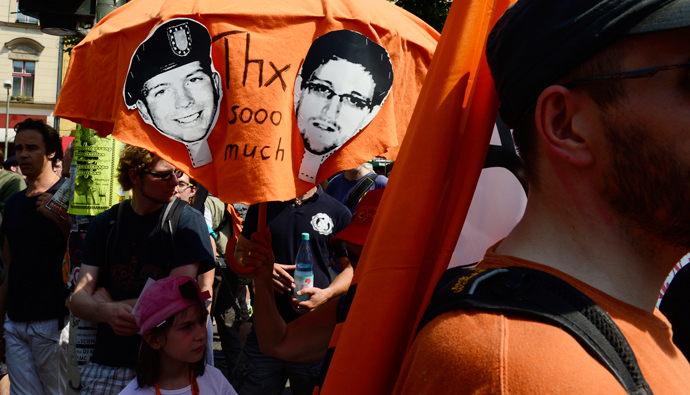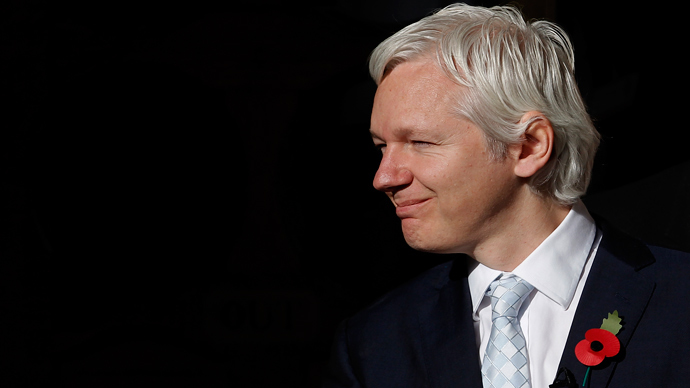WikiLeaks’ major achievement is in weakening the authority of US intelligence, according to the whistleblowing website founder, Julian Assange, who has just marked three years under virtual house arrest in the UK.
Julian Assange believes that the WikiLeaks website he founded
represents “an example of a small publisher beating the
Pentagon” and by doing so reducing the public fear of
government institutions.
“If a small publisher can beat the Pentagon, then some
committed and strong political groups in various countries don't
have to be quite as scared of US as they have been before,”
Assange said in a comprehensive interview given to Slovenia's Delo newspaper. “The US
intelligence agencies have a big budget and immense technological
resources, but the more we learn about them, the more we see how
incompetent they are. They are definitely not real-life James
Bonds. More a vast number of sickly office workers dreaming about
their next holiday.”
Assange has acidly compared the government agencies that had
their activities exposed by WikiLeaks’ revelations, to
“creepy and sleazy beetles which start to run around in panic
when the stone which was shielding them from the daylight is torn
away.”
This panic has led to a severe crackdown on whistleblowers. The
most recent example has been the persecution of Edward Snowden, a
former NSA contractor, who is wanted in the US on espionage
charges and has found temporary asylum in Russia.
Assange himself has spent the last three years
under virtual house arrest in the UK. For more than half of this
time he was confined to a five square-meter room, after he had
been granted asylum in the Ecuadorian Embassy in London, fearing
extradition to Sweden, where he is wanted in relation to a sexual
misconduct investigation. The WikiLeaks founder has labeled the
investigation as politically motivated and has said it will lead
to his further extradition to the US, where he could be brought
to court for leaking sensitive data.
Chelsea (formerly Bradley) Manning, a major WikiLeaks
contributor, was sentenced to 35 years in August 2013 for having
released classified files. Assange believes Manning’s revelations
should have led to quite different trials.
“There is a nasty case concerning our single most popular and
known public disclosure, the video tape of an US Army Apache
helicopter attacking some civilians and Reuters journalists in
Iraq. What is the outcome of it? Manning, who revealed that
document, was sentenced to 35 years in prison, while there are no
disciplinary actions against the gunner, the pilot, or their
superiors - they are still serving in the US military.”

Speaking of his unsuccessful Australian Senate election campaign,
Assange said it had not been in vain, as the WikiLeaks Party had
“established a network of people working for us in
Australia.” The whistleblower insists he wanted to make
politics different and “to come into the Senate as a spy for
the people.”
“During the prosecution of Manning, the District Attorney
said about WikiLeaks that they are ‘the intelligence agency of
the people,' and I consider this a big compliment. It is a phrase
I used years ago to describe us. This is what we are: spies for
the people. If states have their intelligence agencies to spy on
us and control us, should the people and history itself also not
have their own counterintelligence?”
As for Snowden’s revelations, the WikiLeaks founder says he was
not generally surprised to learn of the NSA’s mass surveillance
tactics. It was rather certain individuals’ behavior that had him
stunned, particularly some US personalities’ desire to impose
American values and worldview on Arab and Asian countries.
Assange came up with the example of Google executive Jared Cohen.
“Some documents that were given to me disclose how Cohen and
his collaborators met in London with leading managers of the
Bollywood cinema and promised them financial support from a
covert fund, and link ups with Hollywood if they eliminated
extremist messages – presumably stabs against America. I have no
doubt that while Cohen was corrupting these individuals,
Bollywood, Hollywood, the State Department, the funds accountants
and himself, he thought he was saving poor Indians from
terrorism”.
Assange has also spoken of the WikiLeaks’ uneasy relations with
the media. At first, they were eager to make sensational leaks
public, while, later, they “began to carefully control and
contain the damage to the establishment” and manipulate with the
data they received, redacting certain parts of the documents,
which resulted in distortions of the information they contained.
“For example; there was a cable on Yulia Tymoshenko that said
she's hiding her money in London: they deliberately redacted that
portion,” Assange said, adding that they nevertheless
“did run a big story on how the president of Belarus had
stolen $9 billion. The cable says the allegation was very thinly
sourced from a Ukrainian opposition newspaper via Russia. The
Guardian, which is the UK establishment's preferred attack dog on
the former Soviet, kept the $9 billion theft allegation, but
redacted how the allegation had little credibility. They
published the story immediately before the Belarus
election.”
Assange has called on readers of the media not to be passive news
consumers and to check the information’s credibility at WikiLeaks
website, where the full versions of the classified documents can
be found.
“This is what we want to achieve - to bring people to use
WikiLeaks website the same way millions of us use Wikipedia, as a
universal encyclopedia which allows you to measure the partiality
of other sources of information.”

